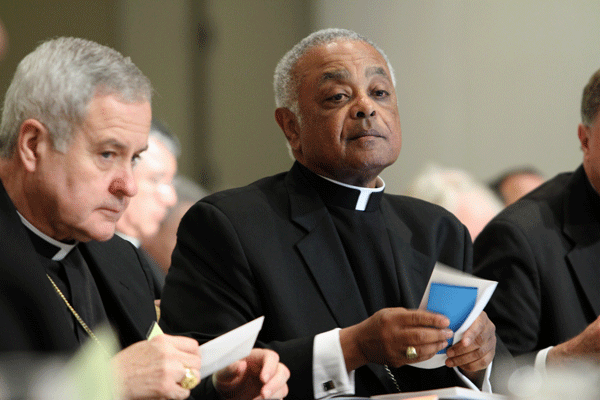 ATLANTA (CNS) — The U.S. bishops June 13 approved a proposal to draft a statement on work and the economy as a way to raise the profile of growing poverty and the struggles unemployed people are experiencing.
ATLANTA (CNS) — The U.S. bishops June 13 approved a proposal to draft a statement on work and the economy as a way to raise the profile of growing poverty and the struggles unemployed people are experiencing.
Titled “Catholic Reflections on Work, Poverty and a Broken Economy,” the message would advance the bishops’ priority of human life and dignity to demonstrate the new evangelization in action, explained Bishop Stephen E. Blaire of Stockton, Calif., chairman of the Committee on Domestic Justice and Human Development.
The bishops voted 171-26 during their spring meeting in Atlanta to move ahead with a draft of the document. It is expected to be ready in time for a final vote at the bishops’ fall meeting in November.
The message would be a follow-up to a Sept. 15, 2011, letter by Cardinal Timothy M. Dolan of New York, president of the U.S. bishops’ conference, in which he urged bishops and priests across the country to preach about “the terrible toll the current economic turmoil is taking on families and communities.”
That letter was sent at the urging of the bishops’ Administrative Committee, which directs the work of the U.S. Conference of Catholic Bishops between general assemblies. The committee “wanted something more than a public statement,” the cardinal said in the letter.
Now, Bishop Blaire explained, the Committee on Domestic Justice and Human Development felt that because poverty continues to grow and the economy continues to lag, it is time to address the human and moral costs of the continuing economic crisis in a more public way.
“We can say to our people that we can identify with what you are going through,” he said.
The message would build upon the bishops’ 1986 pastoral letter on the economy “Economic Justice for All,” Bishop Blaire explained, and would focus on specific challenges that have emerged since the economic downturn began in late 2007.
In a document distributed to the bishops prior to the discussion, the committee proposed a 12- to 15-page pastoral message to communicate the bishops’ pastoral concerns as well as solidarity with those “left behind in our economy,” especially workers without jobs and families living in poverty.
A message on the economy would “seek to get beyond some of the ideological and partisan polarization” surrounding economic issues, the document said. It would recognize that personal responsibility and public action, family structure and economic structures and solidarity and subsidiarity are essential, it said.
“We are not out to provide answers,” Bishop Blaire said in explaining the purpose of the message. “Neither are we out to enter into the complicated difficult approaches to the economy. The purpose is to raise up the principles of the church, the principle of Catholic social teaching so that the very people you are talking about can struggle with these and evaluate their position in light of the teaching of the church.”
The message also would serve to lift up the human family and the moral, social, spiritual and community costs of the economic downturn, Bishop Blaire said. It would share and apply Catholic teaching on economic life, work and poverty, particularly pointing to Pope Benedict XVI’s encyclicals on charity “Deus Caritas Est” (“God is Love”) and “Caritas in Veritate (“Charity in Truth”).
The message also would invite parishioners to begin discussing the moral dimensions of the economy and tie the challenges Americans are facing with the global economy and the situation of workers and the poor around the world.
He also said individual dioceses and parishes could use the pastoral message as needed in their locales and that it would not lead to a mandated national program.
“It would be a document asking for engagement, asking our people and all who are out there as part of the larger community to engage, to reflect, to pray, to discuss and to see what the Gospel can bring into the economy,” Bishop Blaire said.
Several bishops spoke in favor of the motion during a discussion period. Archbishop Joseph F. Naumann of Kansas City, Kan., suggested that it also address the growing U.S. government’s debt and its impact on the economy.
Cardinal Dolan will appoint members of the drafting committee.
— By Dennis Sadowski, Catholic News Service





